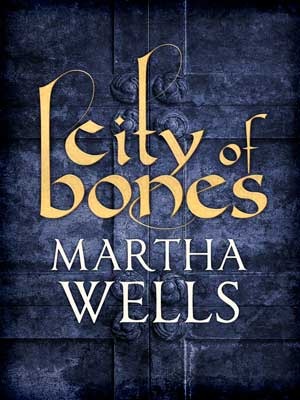 City of Bones, Martha Wells
City of Bones, Martha Wells
Review from 15th July, 2013.
I don’t know what to think of this book. It’s my first Martha Wells book, and I’m promised some of her others are even better: this one is beautiful in its attention to detail, its careful worldbuilding. I enjoyed a lot that this is fantasy and post-apocalyptic work at the same time: we’re talking magic here, not science, not even science that looks like magic. This is what I’ve hungered for — a one-shot fantasy story that isn’t focused on romance or anything other than solid characters and a solid plot.
There’s a lot of really fascinating aspects to this world. There’s some interesting gender stuff going on with the main character, Khat. He’s part of an engineered race who are like humans but have various modifications to better suit the conditions of their post-apocalyptic world. One example being their ability to tell where north is by instinct. Another being the fact that both men and women can bear young in pouches. Then there’s the fact that the kris — Khat’s people — are sought after by some high class women because they can’t interbreed with humans: it’s not high class men taking advantage of poor women, but the other way round (in effect). And the high class women all have very short hair, while high class men wear veils. One of the main characters, Elen, has a powerful role to begin with and becomes more powerful in her society as the story goes on; the ruler’s heir is a woman.
At the same time, there’s some possessiveness around women and an expectation that they’ll stay home and have children, so it’s not quite turned completely around.
Khat is a great character: tough, smart, but not infallible and not all-knowing. I can believe in the people around him, the bonds he has to others — I love the awkwardness with Elen at the end, and the comfortableness he always has with Sagai because Sagai understands Khat isn’t going to confide everything in him. I liked that the “bad” characters aren’t completely one-sided (except the Inhabitants and perhaps the Heir), and though I saw it coming, I liked what became of “mad” Constans.
I love the details of the world, the fact that water is a commodity — which isn’t a hugely original idea, but which fits so well here and isn’t used as some kind of dystopic problem, but just as a background to the story, a part of the system of commerce and trade.
I really enjoyed the fact that this is sort of a fantastical Indiana Jones with aristocratic scheming moving the pieces, too. The details of the relics, the academic discussions around them… That’s my world, really, at least on the literature side of things, and it’s lovely to have a hero for whom that is a big draw.
There’s a lot of genuine sense of wonder and beauty, here, and the author steers away from a too-convenient ending. People die, friendships are stillborn, and the world ticks on as before with the person who made that possible barely rewarded. Very enjoyable, and I’m looking forward to reading more of Wells’ stuff.
Rating: 4/5

A good stand-alone fantasy is worth a great deal, and Martha Wells has done some of the best, in my opinion. I rank City of Bones slightly below Wheel of the Infinite only because of the appeal of the setting and because of Maskelle’s humor, which just makes her someone I enjoy. I have not gotten into her series books as much as the others; although The Element of Fire and Death of the Necromancer spring from the same source, they are so separate it is easy to read them as stand-alone stories. I’m still waiting for a book about Reynard…he appears to have quite a fan following despite originally being a minor character.
I’ve got those to read too, and I’m very much looking forward to it — I’ve still only read a couple of Martha Wells’ books.
This is the second review I read today praising a book for reversing gender roles. I understand the attraction, but unless you say something with putting women in positions of power and sexual assertiveness, you haven’t done much.
Standalone fantasy books are so rare that this fact was enough for me to get curious and read the rest of the review.
I don’t think you have to “say something” for it to be interesting, though. It doesn’t have to have an explicit message; the very flipping of roles can make readers think and wonder. It can be discomforting, in a good way.
Apparently a lot of her books stand alone quite well!